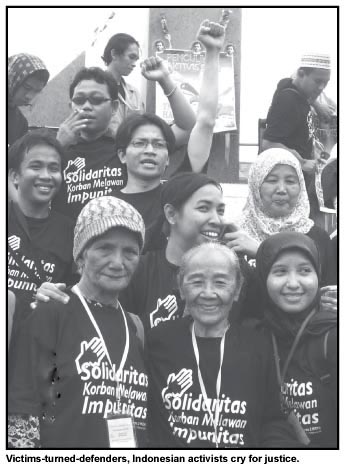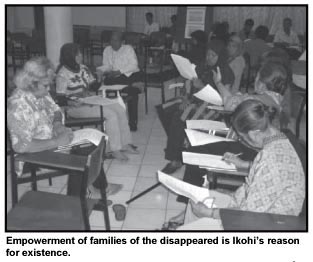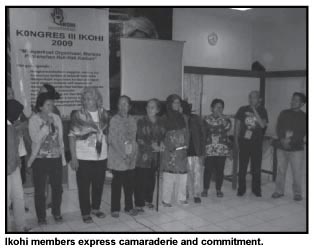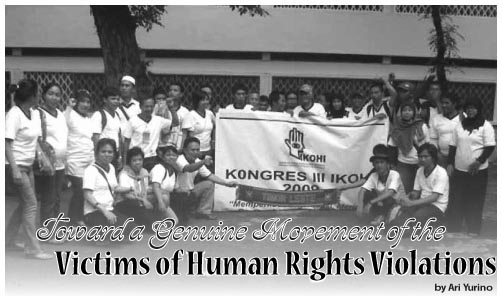Since 1998, Indonesia has been moving into the
democracy transition era. However, twelve years have passed, yet human
rights enforcement has not yet been realized. Twelve years of democracy
transition merely produces a more profound grip of neo-liberalism,1
political power and continued impunity of human rights violators. Four
presidents have occupied the palace and three elections have been
carried out to appoint legislators. But it only means transfer of power,
but does not provide benefit to the people..
During the last election, Soesilo Bambang Yudhoyono (SBY)
was re-elected the President of the Republic of Indonesia (RI) for
the second term with 65 percent vote. Competed political parties at the
election subsequently support the SBY administration, with distributed
ministry and other government posts as the reward. It is a reality
taking place in Indonesia following such an aggressively promoted
democratic election, which ends up in a regime revival. Certainly, no
political parties would oppose the SBY regime, as they wish to play at
the economically and politically comfort zone. It is the so-called
CARTEL OF POLITICAL PARTY, a combination of political parties – similar
to companies – having characters of economic and political monopoly as
carrying capacity of a regime of neo-liberalism.
Apparently, the second chance of presidency has not
yet provided assurance to pro-victims human rights enforcement. This is
reflected in the recommendation of National Summit carried out on
29-30 October 2009 in Bidakara Hotel, Jakarta soon after SBY was
inaugurated as the President of the RI. The National Summit was a
meeting to formulate Indonesia’s strategic program planning both within
the president’s 100 days and the next five years. However, none of
substance of the strategic plan includes the resolution of the gross
human rights violations of the past. The National Summit only
promised the making of new regulations and bureaucracy rimming or
the creation of new bureau/agency planned to cover 15 areas, which
include (1) eradication of judicial mafia; (2) revitalization of defense
industry; (3) counterterrorism; (4) power lines handling; (5) increasing
food production and tenacity; (6) revitalization of fertilizer and sugar
manufacture; (7) reform of complexity regarding the use of land and
spatial; (8) increasing infrastructure; (9) increasing loan credit for
micro, small, and medium businesses; (10) climate and environmental
change; (11) funding; (12) health reform by changing the society’s
paradigm; (13) education reform; (14) disaster response preparedness;
and (15) coordination of central and provincial government.
During the first five years of the SBY
administration, completed cases of human rights violations investigated
by human rights national committee ended up as piles of archives in the
Attorney General’s Office. During his last five years of power, Toward a
Genuine Movement of the none of the cases of gross human rights
violations was brought to court. The trial of Munir’s case, which
attracted domestic and international public attention, resulted in the
acquittal of the alleged perpetrators. Such facts show that the
commitment to human rights protection and enforcement which become the
government’s rhetoric is merely a political cosmetic for the ruler’s
imaging interest, and not for fulfilling justice for human right victims
and their families.
 The
enforced disappearance of activists in 1997/1998 urged the Parliament in
its plenary meeting to come up with the following recommendations that
contain: (1) To recommend to the President the establishment of an
Ad-hoc human rights court; (2) To recommend the President and the entire
government agencies and related parties to immediately search for the
disappeared 13 activists; (3) To recommend the government to
rehabilitate and compensate the families of the disappeared; (4) To
recommend the government to immediately ratify the UN Convention for the
Protection of All Persons from Enforced Disappearance and support to
stop forced disappearances in Indonesia. However, those recommendations,
to date, are stagnant as no further follow-up actions have been
conducted to implement them.
The
enforced disappearance of activists in 1997/1998 urged the Parliament in
its plenary meeting to come up with the following recommendations that
contain: (1) To recommend to the President the establishment of an
Ad-hoc human rights court; (2) To recommend the President and the entire
government agencies and related parties to immediately search for the
disappeared 13 activists; (3) To recommend the government to
rehabilitate and compensate the families of the disappeared; (4) To
recommend the government to immediately ratify the UN Convention for the
Protection of All Persons from Enforced Disappearance and support to
stop forced disappearances in Indonesia. However, those recommendations,
to date, are stagnant as no further follow-up actions have been
conducted to implement them.
On the other hand, the pace of neo-liberalism hits
the victims’ families who have been impoverished by the human rights
violation they have been through as well. Such a condition is worsened
by the State’s policy that blinds itself from the right to recover and
rehabilitate victims. Legal procedures and laws that flow into the
State’s reluctance to fulfill its responsibility towards victims are
real evidence of the government’s anti-justice and anti-victims stance.
Experience fortifies organizations of human rights violation victims
The IKOHI Federation of organizations of victims of
human rights violation and their families
From the above-mentioned facts, the State’s power to
hold its responsibility to fulfill justice for victims of human rights
violation and their families in Indonesia is certainly needed. The
IKOHI as organization of victims of human rights violation and their
families in Indonesia continues to encourage the victims’ awareness to
get involved in organizations of human rights violation at the
provincial level. In addition to the organization’s reinforcement,
capacity building of human rights violation victims and their families
in running their organizations and laying a foundation of public support
is also needed.
The IKOHI is an organization of victims of
human rights violation and their families. At 7-9 December 2009, victims
of human rights violations and their families who join the IKOHI,
carried out the 3rd Congress. The Congress, participated in by victims
of human rights violation across Indonesia, from Aceh to Papua, and
Timor Leste, provided the agenda of organizational reinforcement and
efforts to pioneer the victims’ rights fulfillment, which were the main
issue discussed within the 3-day congress.
 The
IKOHI as organization of victims of human rights violation and
their families in Indonesia has limitations in managing and coordinating
its network at regions. Issues on coordination and communication were of
hot debate during the congress, considering that a developed
communication between the IKOHI in Jakarta and district network
of victims’ organization is less effective. However, this was solved by
the agreement to modify the organization - from an association to a
federation. It impacts on its membership, which previously was based on
individuals, now organizations. By this, it is also expected the clear
upcoming coordination between IKOHI in Jakarta and network of
victims’ organizations at the regional level.
The
IKOHI as organization of victims of human rights violation and
their families in Indonesia has limitations in managing and coordinating
its network at regions. Issues on coordination and communication were of
hot debate during the congress, considering that a developed
communication between the IKOHI in Jakarta and district network
of victims’ organization is less effective. However, this was solved by
the agreement to modify the organization - from an association to a
federation. It impacts on its membership, which previously was based on
individuals, now organizations. By this, it is also expected the clear
upcoming coordination between IKOHI in Jakarta and network of
victims’ organizations at the regional level.
Other interesting matters occurring besides the
modification of organization type was the enlargement of new contacts
who are prepared to become part of the IKOHI or build victims’
organization in their regions, such as Polewali Mandar (West Sulawesi),
Samarinda (East Kalimantan), Kupang (NTT), and Palembang (South Sumatera).
It is certainly complying with the effort to reinforce organizations of
victims of human rights violations and their families in Indonesia in
order to enlarge mass power.
In addition to the victims’ organizational
enforcement, it was also agreed that the IKOHI focuses as an
organization of victims of human rights violations and their families in
Indonesia. It is an effort to pioneer the fulfillment of the victims’
rights. In this case, it refers to how recovery rights of victims and
their families can be fulfilled. This will, at the end, distinguish the
IKOHI from other organizations. To date, the IKOHI has
actually possessed adequate means to attain recognition as organization
of victims of human rights violation and their families that works to
independently fulfill recovery rights. Since 2005, the IKOHI has
been providing counseling service to victims of human rights violation
and their families to minimize the trauma resulting from human rights
violations. This counseling service also refers to efforts of truth
disclosure so that victims and their families are encouraged to reveal
facts of what has happened during their incident regarding human rights
violations.
Scholarship program to victims’ families, in
collaboration with AFAD, has become the IKOHI work focus for
years. It is expected that the victims’ families are able to continue
their education to the highest level. Networks of victims’ organizations
in regions such as Aceh, Jakarta, Palu and Papua have received the
benefit from this scholarship program.
Of all the discussion, the IKOHI has finally
prioritized its works in 2 (two) programs - recovery and reinforcement
and justice. Those programs are clearly familiar for the IKOHI
based on its experience from 2006- 2009. The IKOHI has always
been focused on victims of human rights violations and their families.
 Representation
of victims in the IKOHI administration became a serious
consideration in its 3rd Congress as well. This will clearly distinguish
the IKOHI as organization of victims of human rights violations
and their families from other organizations in Indonesia. In the 3rd
Congress, Mugiyanto (chairman of the IKOHI 2006-2009 and survivor
of activists who disappeared in 1997/1998) was reelected the Chairman of
the IKOHI Federation 2009-2012. Wanma Yetty (family member of one
of the Tanjung Priok victims) was elected General- Secretary of the
IKOHI Federation. It is expected for the incoming period that there
be a larger composition of victims of human rights violation and their
families within the IKOHI Federation. It is also the homework of
the IKOHI Federation to build the capacity and capability of
victims of human rights violation and their families to run their own
organizations.
Representation
of victims in the IKOHI administration became a serious
consideration in its 3rd Congress as well. This will clearly distinguish
the IKOHI as organization of victims of human rights violations
and their families from other organizations in Indonesia. In the 3rd
Congress, Mugiyanto (chairman of the IKOHI 2006-2009 and survivor
of activists who disappeared in 1997/1998) was reelected the Chairman of
the IKOHI Federation 2009-2012. Wanma Yetty (family member of one
of the Tanjung Priok victims) was elected General- Secretary of the
IKOHI Federation. It is expected for the incoming period that there
be a larger composition of victims of human rights violation and their
families within the IKOHI Federation. It is also the homework of
the IKOHI Federation to build the capacity and capability of
victims of human rights violation and their families to run their own
organizations.
The 3rd IKOHI Congress was certainly expected
to be a new beginning in improving and reinforcing the organization and
pioneering rights of victims. It is not an easy task. High fighting
spirit is needed in order for the IKOHI Federation to become the
main driving force of the victims’ movement in Indonesia.
Building organization of forced disappearance in Aceh
The previous similar experience was implemented in
Aceh. As there are many cases of enforced disappearance taking place in
Aceh during the period of military operation zone (Daerah Operasi
Militer—DOM), martial law (Darurat Militer—DM) and civil
emergency (Darurat Sipil—DS), there is a need to consolidate
victims of forced disappearance and their families to fight for
settlement of forced disappearance cases taking place in Aceh. From the
very idea, the establishment of organization of victims of enforced
disappearance and their families namely Keluarga Ureung Gadoeh (Kagundah)
Aceh was realized. The meaning of the organization’s name is: the
families of the disappeared in Aceh.
The IKOHI attended the congress of the
Kagundah establishment, which was carried out in 10-12 October 2009
in Banda Aceh. The congress was attended by 210 families of victims of
enforced disappearance victims in Aceh, coming from 10 districts. The
participants were so enthusiastic to attend and join in all congress
sessions of the organization’s establishment. It was due to the fact
that the victims of forced disappearance and their families were not
accustomed to join in organizations or even did not know about
organizations. During the congress, they had the opportunity to learn,
little by little, methods to establish and manage the organization.
The 3 -day congress then decided Rukayah as Secretary
General who will lead in 10 regions in Aceh in 2009-2012. To help
coordinate from the central (at the province level) to district level, a
presidium was established as representatives of each region and will
become "the extension of the people’s tongue" of regions.
 The
different organizations’ establishment in each region was also decided,
which will coordinate with its central organization at the provincial
level.
The
different organizations’ establishment in each region was also decided,
which will coordinate with its central organization at the provincial
level.
In addition, it was also resolved that cases of
enforced disappearance in Aceh be handed over to Aceh’s House of
Representatives (DPRA) for the follow-up actions. One of the
Kagundah’s proposition was to have the Aceh government immediately
resolve cases of enforced disappearance taking place in Aceh.
It is certainly not easy to run this organization,
considering the minimum experience of the Kagundah committee.
However, their high fighting spirit and strong will to learn from other
organizations will eventually write-off their weaknesses gradually. The
IKOHI support to the Kagundah will not just end. The
stronger region-level organizations of victims of human rights violation
and their families will produce significant impacts to victims of human
rights violations movement in Indonesia.
__________________________
1 Neo-liberalism manages the State as
free market for investment, the market for the use of workforce, to
trade consumer goods, and hence change the function of the State’s
government only as the regulation maker which supports the free market.
At the crisis, neo-liberal regime needs reformation of financial policy,
free market management, and others through revision of regulation
or the making of new regulations, followed by agencies establishment as
guarantor and comptroller of regulations.

Ari Yurino
is a member of the Staff of House of Justice of IKOHI Federation.
Organizational strength lies in unity and solidarity.

